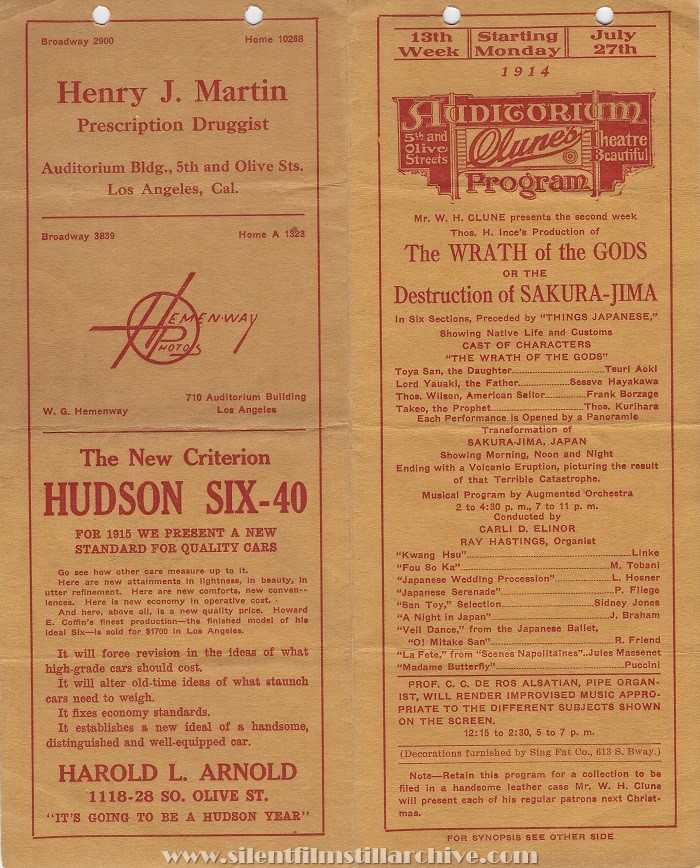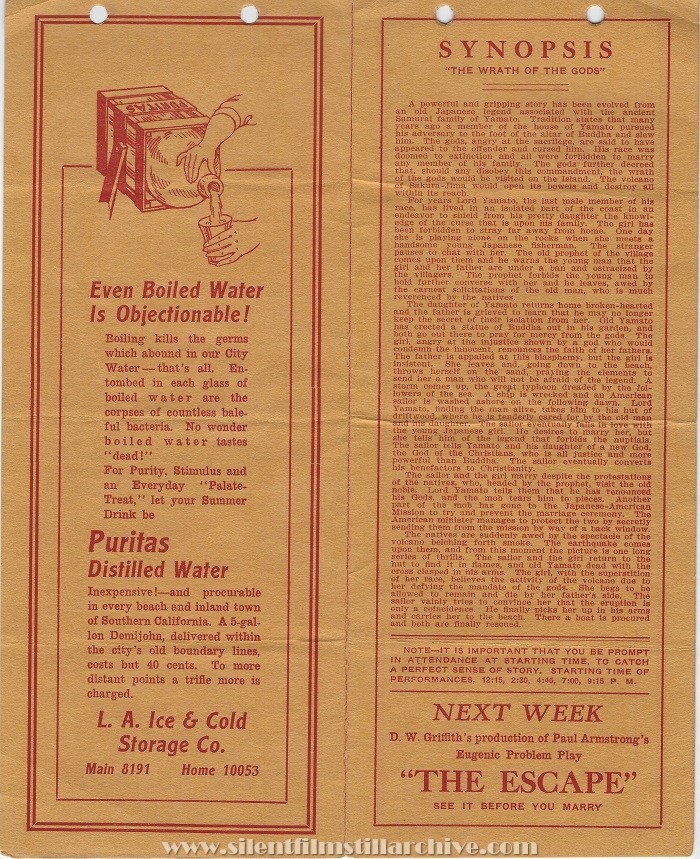![]()

Clune's Auditorium, Los Angeles, California - July 27, 1914

13th Week Starting Monday July 27th, 1914
Clune's Auditorium
Theatre Beautiful
Program
5th
and Olive Streets
Mr. W. H. CLUNE presents the second week
Thos. H. Ince's Production
of
The WRATH of the GODS
or the
Destruction of SAKURA-JIMA
In Six Sections, Preceded by "THINGS JAPANESE,"
Showing Native Life
and Customs
CAST OF CHARACTERS
"THE WRATH OF THE GODS"
| Toya San, the Daughter | Tsuri Aoki |
| Lord Yauaki, the Father | Sessue Hayakawa |
| Thos. Wilson, American Sailor | Frnk Borzage |
| Takeo, the Prophet | Thos. Kurihara |
Each Performance is Opened by a Panoramic Transformation of
SAKURA-JIMA, JAPAN
Showing Morning, Noon and Night
Ending with a
Volcanic Eruption, picturing the result of that Terrible Catastrophe.
Musical Program by Augmented Orchestra
2 to 4:30 p.m., 7 to 11 p.m.
Conducted by CARLI D. ELINOR
RAY HASTINGS, Organist
| "Kwang Hau" | Linke |
| "Fou So Ka" | M. Tobani |
| "Japaese Wedding Procession" | L. Hosner |
| "Japaese Serenade" | P Fliege |
| "San Toy," Selection | Sidney Jones |
| "A Night in Japan" | J. Braham |
| "Viel Dance," fro the Japanese Ballet, "O! Mitake San" | R. Friend |
| "La Fete," from "Scenes Napolitaines" | Jules Massenet |
| "Madame Butterfly" | Puccini |
PROF. C. C. DE ROS ALSATIAN, PIPE ORGANIST, WILL RENDER IMPROVISED MUSIC APPROPRIATE TO THE DIFFERENT SUBJECTS SHOWN ON THE SCREEN, 12:15 TO 2:30, 5 TO 7 p.m.
(Decorative furnished by Sing Frat Co., 613 S. Bway.)
Note -- Retain this program for a collection to be filed in a handsome leather case Mr. W. H. Clune will present each of his regular patrons next Christmas.
FOR SYNOPSIS SEE OTHER SIDE.
Broadway 2900 Home
10268
Hennry J. Martin
Prescription Druggist
Hemenway Photos
W. G. Hemenway
710 Auditorium Building
Los Angeles
The New Criterion
HUDSON SIX-40
FOR 1915 WE
PRESENT A NEW STANDARD FOR QUALITY CARS
Go see how other cars measure up to it.
Here are new attainments inn lightness, in beauty, in utter refinement. Here are new comforts, new conveniennces. Here is new economy in operative cost.
And here, above all, is a new quality price. Howard E. Coffin's finest production -- the finished model of his ideal six -- is sold for $1700 in Los Angeles.
It will force revision in the ideas of what high-grade cars should cost.
It will alter old-time ideas of what staunch cars need to weigh.
It
fixes economy standards.
It establishes a new ideal of a handsome,
distinguished and well-equipped car.
HAROLD L. ARNOLD
1118-28 SO. OLIVE ST.
"IT'S
GOING TO BE A HUDSON YEAR"

Even Boiled Water is Objectionable!
Boiling kills the germs which abound in our City Water -- that's all. Entombed in each glass of boiled water are the corpses of countless baleful bacteria. No wonder boiled water tastes "dead!"
For Purity, Stimulus and an Everyday "Palate-Tread," let your Summer Drink be
Puritas Distilled Water
Inexpensive! -- and procurable in every beach and inland town of Southern California. A 5-gallon Demijohn, delivered within the city's old boundary lines, costs but 40 cents. To more distant points a trifle ore is charged.
L. A. Ice & Cold Storage Co.
Main 8191
Home 10051
SYNOPSIS
"THE WRATH OF THE GODS"
A powerful and gripping story has been evolved from an old Japanese legend associated with the ancient Samurai family of Yamato. Tradition states that many years ago a member of the house of Yamato pursued his adversary to the foot of the altar of Buddha and slew him. The gods, angry at the sacrilege, are said to have appeared to the offender and cursed him. His race was doomed to extinction and all were forbidden to marry any member of his family. The gods further decreed that, should any disobey this commandment, the wrath of the gods would be visited on the Island. The volacno of Sakura-Jima would open its bowels and destroy all within its reach.
For years Lord Yamato, the last male member of his race, has lived in an isolated part of the coast in an endeavor to shield from his pretty daughter the knowledge of the curse that is upon his family. The girl has been forbidden to stray far away from home. One day she is playing alone on the rocks when she meets a handsome young Japanese fisherman. The stranger pauses to chat with her. The old prophet of the village comes upon them and he warns the young man that the girl and her father are under a ban and ostracized by the villagers. The prophet forbids the young man to hold further converse with her and he leaves, awed by the earnest solicitations of the old man, who is much reverenced by the natives.
The daughter of Yamato returns home broken-hearted and the father is grieved to learn that he may no longer keep the secret of their isolation from her. Old Yamato has erected a statue of Buddha out in his garden, and both go out there to pray for mercy from the gods. The girl, angry at the injustice shown by a god who would condemn the innocent, renounces the faith of her father. The father is appalled at this blasphemy, but the girl is insistent. She leaves and, going down to the beach, throws herself on the sand, praying the elements to send her a man who will not be afraid of the legend. A storm comes up, the great typhoon dreaded by the followers of the sea. A ship is wrecked and an American sailor is washed ashore on the following dawn. Lord Yamato, finding the man alive, takes him to his hut of driftwood, where he is tenderly cared for by the old man and his daughter. The sailor evenntually falls in love with the young Japanese girl. He desires to marry her, but she tells him of the legeng that forbids the nupitals. The sailor tells Yamato and his daughter of of a new God, the God of the Christians, who is all justice and more powerful than Buddha. The sailor eventually converts his beefactors to Christianity.
The sailor and the girl marry despite the protestations of the natives, who, headed by the prophet, visit the old noble. Lord Yamato tells them that hs has renouced his Gods, and the mob tears him to pieces. Another part of the mob has gone to the Japanese-American Mission to try and prevent the marriage ceremony. The American minister manages to protect the two by secretly sending them from the mission by way of a back window.
The natives are suddenly awed by the spectacle of the volcano belching forth smoke. The earthquake comes upon them, and from this moment the picture is one long series of thrills. The sailor and the girl return to the hut to find it in flames, and old Yamato dead with the cross clasped in his arms. The girl, with the superstition of her race, believes the activity of the volcano due to her defying the mandate of the gods. She begs to be allowed to remain and die by her father's side. The sailor vainly tries to convince her that the eruption is onlya coincidence. he finally picks her up in his arms and carries her to the beach. There a boat is procured and both are finally rescued.
NOTE -- IT IS IMPORTANT THAT YOU BE PROMPT IN ATTENDANCE AT STARTING TIME, TO CATCH A PERFECT SENSE OF STORY, STARTING TIME OF PERFORMANCES, 12:15, 2:30, 4:45, 7:00, 9:15 P.M.
NEXT WEEK
D. W. Griffith's production of Paul Armstrong's Eugenic Problem Play
"THE ESCAPE"
SEE IT BEFORE YOU MARRY
More Information on Clune's Auditorium...
Clune's Auditorium at CinemaTreasures.com
Last Modified May 31, 2021